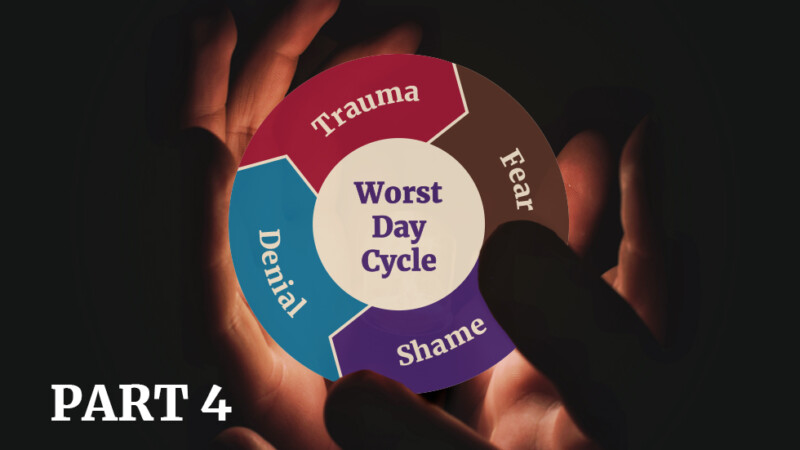As a species, we need two things to survive, attachment to another human being and the ability to pursue our authentic selves. Because our caregivers are human and therefore, perfectly imperfect, we survive by dropping our authentic selves to create attachment. The loss of our authentic self creates shame. In part 4 of my 5-part series on how to heal The Worst Day Cycle, I will share how shame keeps us locked into repeating the pain from the past against ourselves.
What’s important to know about shame?
Shame is all about control. As a child, we don’t have the emotional or cognitive development to handle the overwhelming emotional nature of our parent’s perfect imperfections. We are powerless to stop their imperfections and powerless to make sense of them. We create a false persona to hide our hurt feelings from ourselves and more importantly, to create a life-saving attachment with our parents.
Even the rebellious black sheep of the family who is always causing frustration for their parents have found a unique way to forge attachment. They are exercising negative control – disorder and dysfunction – to get the attention and attachment they crave. Creating trouble works, it gives us power and attachment.
Adulthood
As we mature into adulthood we refine our ability to exercise our shame-based power over others. We subconsciously choose partners, careers, even friends, and hobbies that will replay the same neglectful abandoning hurtful emotional experiences of our childhood.
John Bradshaw explains shame and the loss of self this way, ‘The wounded inner child contaminates intimacy in relationships because he has no sense of his authentic self. The greatest wound a child can receive is the rejection of his authentic self. When a parent cannot affirm his child’s feelings, needs, and desires, he rejects that child’s authentic self. Then, a false self must set up.
You cannot offer yourself to another person if you do not know who you really are. Toxically shamed people tend to become more and more stagnant as life goes on. They live in a guarded, secretive and defensive way. They try to be more than human (perfect and controlling) or less than human (losing interest in life or stagnated in some addictive behavior). A shame-based person will guard against exposing his inner self to others, but more significantly, he will guard against exposing himself to himself.’
Blame on Other People
Why do you not want to share your history with others? Because you don’t want to share it with yourself and because toxically shamed people will not want to hear or accept things about themselves. People who chastise others are always chastising themselves – it is always a reflection of their own inner shame.
Bradshaw Says:
Bradshaw goes on to say, ‘The voice is mostly created by the shame-based, shut-down defenses of the primary caregivers/society. Just as the shame-based parents/society cannot accept their own weaknesses, wants, feelings, vulnerability, and dependency needs, they cannot accept their children’s neediness, feelings, weakness, vulnerability, and dependency. That voice is the result of the “parents/societies desire to destroy the aliveness and spontaneity of the child whenever he or she intrudes on their defenses.
We must remember that the shame-based caregivers/society were once hurting children themselves. Like ours, their pain, humiliation, and shame were repressed. Their anger toward their shaming parents/society could not be expressed for fear of losing the parent/place in the world. The parents’/societies defenses against their pain and shame prevent these feelings from erupting into consciousness. If the parent/society were to let the child express those feelings, it would threaten their own defenses. The parent/society must stop the child’s feelings of neediness and pain so that the parent and society doesn’t have to feel their own feelings of neediness and pain.’
Admit to Shame
It is difficult to consciously admit to shame, trauma, pain and imperfect upbringings. Shame is about control, so to get angry and chastise others when they bring this to our attention is an attempt to control the reality we have always known.
Interestingly, shame is the core motivator of the super achieved and the underachieved. Many people with high levels of shame are falsely empowered, Bradshaw says, ‘The distorted thinking can be reduced to the belief, “I’ll be okay if I drink, eat, have sex, get more money, work harder, etc.” The shame turns a person into a “human doing,” rather than a human being.’ The super achieved do this to show they are successful and independent and high-achieving when really they are just trying to cover up their feelings of intense shame.
Alice Miller
Alice Miller discusses this very succinctly when she talks about the successful person, ‘The contempt for others in grandiose, successful people always includes disrespect for their own true selves, as their scorn implies: “Without these superior qualities of mine, a person is completely worthless.” This means further: “Without these achievements, these gifts, I could never be loved, and would never have been loved.”
Take Donald Trump, as an example, he was unable to ever admit he was wrong – he was horrifically abused as a child, his dad always told him he wasn’t enough, so he became a super-achiever in order to be better than his dad because without these achievements he would never be loved. This is more than just parenting though, we live in a shame-based society that is upheld by those at the top, and because we won’t call it out, it doesn’t change. We avoid emotions and Emotional Authenticity to keep our shame alive!
Cognitive addiction
Every thought starts as a feeling – the emotion comes first. Yet, we all denounce feelings and instead try to think our way through things. Which is a waste of time because you can’t change your thoughts until you change your feelings. As Bradshaw says, ‘Cognitive addictions are a powerful way to avoid feelings. I lived in my head for years. I was a university professor. Thinking can be a way to avoid feelings. All addictions have a thinking component, which is an obsession.’
This also applies to the emotionally vulnerable. They hide their shame behind being the ‘nice’ person. Being nice is a covert way of playing the victim because the nice person. Wants recognition for being such a nice person. They continually pick people and situations where they give more, do more.
Whether we exercise our shame from the falsely empowered or disempowered position. The loss of self replays itself in pain against ourselves.
Bradshaw continues, ‘Unconditional love and acceptance of self seems to be the hardest task for all humankind. Refusing to accept our “real selves,” we try to create more powerful false selves. We give up and become less than human. This results in a lifetime of cover-up and secrecy. This secrecy and hiding is the basic cause of human suffering.’
Healing shame requires becoming an expert in reclaiming your authentic self
To become an expert we need to accept the following:
- Learned denial in childhood to survive
- Adapted false personas to create attachment.
- Self-victimize to get our power back
We know we have recovered when we can laugh at ourselves. Laugh at our perfect imperfections and share them openly with others. If you need help learning how to do that here are some suggestions:
1- Take my free masterclass, ‘Your Journey to Emotional Authenticity’
2- Watch my 5-part video series on Youtube- Reclaim Your Authentic Self By Becoming Trauma-Informed.
3- Pick up a copy of my book ‘Your Journey to Success’
It’s not an easy journey, but I promise if you choose to do this healing work, you’ll discover the truth about the world and about yourself, which will produce true freedom in your life. Take your time and, as always, enjoy the journey.
Learn More here:




